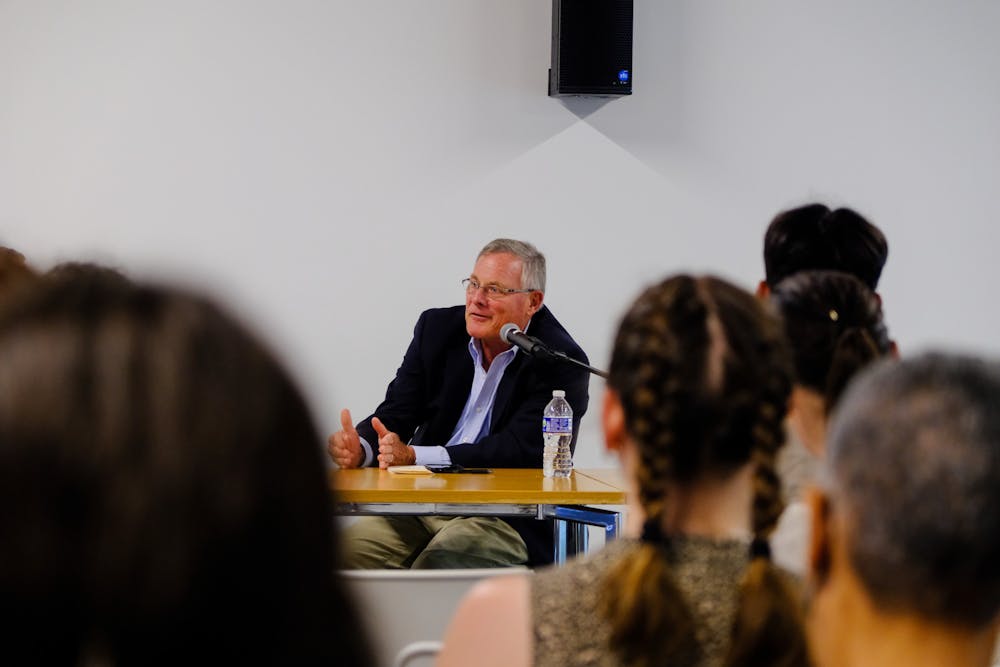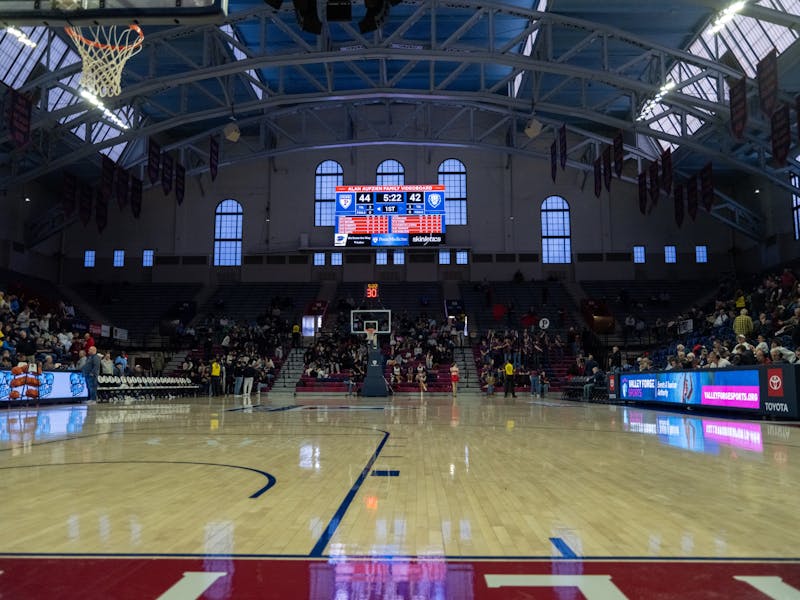
Former North Carolina U.S. Senator Richard Burr spoke at a SNF Paideia event on Sep. 12.
Credit: Abhiram JuvvadiFormer U.S. Sen. Richard Burr (R-North Carolina) spoke to students about his experience in American politics at a SNF Paideia event on Tuesday afternoon.
Over 30 students and community members gathered in the Perelman Center for Political Science and Economics forum to attend the event, which was moderated by political historian and 2006 College graduate Brian Rosenwald, who is also a Scholar in Residence at the College of Liberal and Professional Studies.
The event, part of the Gamba Family Red and Blue Exchange program, featured a conversation between Rosenwald and Burr, followed by a question and answer session from audience members about subjects ranging from American health policy to the future of artificial intelligence and student loan forgiveness.
“I think that the academic setting really does generate conversation from both sides, and I don’t mean that from a political sense, but both sides of an issue,” Burr told The Daily Pennsylvanian in an interview after the event, adding that “more and more, we see that issues are not driven by one party.”
Burr said that the event hopefully taught students that “public service is not a bad thing, but public service is also not necessarily what you have to do for a career.”
During the event, Burr spoke extensively about the future of technology in the workforce and repeatedly emphasized the importance of studying developing subject areas, including engineering, computer science, and cybersecurity.
Burr, a Republican of North Carolina, served three terms in the Senate before retiring in Jan. 2023. Before his career in the Senate, he was elected five times to the House of Representatives from North Carolina’s Fifth congressional district. Burr made national news in 2021 as one of the seven Republicans who voted to convict 1968 Wharton graduate and former President Donald Trump of inciting an insurrection on Jan. 6, 2021, during his second impeachment trial.
Trump is currently the subject of multiple ongoing investigations and was recently indicted with three criminal conspiracies concerning his false claims about the 2020 presidential election.
“I think what the current indictments display is bad judgment on the part of him as an individual,” Burr told the DP.
During the conversation, Burr explained to the audience how consumers compare prices with reviews for all sorts of products, with the exception of healthcare offerings, drawing a divergence from how consumers select goods from Amazon. A potential solution, he said, is increasing transparency.
“Somehow, we have to force that transparency so people take a more active role in being a consumer of health care — and that means knowing what you’re getting and how much it costs,” Burr said.
Regarding student loan forgiveness, Burr said that he did not favor the plans offered by Congress and the White House, adding that he believes education should be like health care.
In response to an audience question on the right-ward shifts of the Republican Party and increased polarization in recent years, Burr said, “It’s not a Congress that reflects what I joined 28 years ago.”
Burr is not the first national political figure to speak at a Paideia event. Former National Security Advisor John Bolton spoke to students in April 2022. He discussed the ongoing Russia-Ukraine War and his relationship with Trump.
Rosenwald told the DP that it is important that political figures with diverse perspectives are brought to campus to talk about policy and substance. He added that he’s always looking for “thoughtful people who are really immersed in policies and the policy landscape” and that Burr fits into such a characterization.
“Sometimes the biggest names are not the most interesting — they’re not as focused on substance,” Rosenwald said. Burr, an expert on health policy and intelligence, was able to complement Paideia's typical focus on domestic policy, according to Rosenwald.
Rosenwald said Penn students would benefit from Burr’s “dual perspective.”
The Daily Pennsylvanian is an independent, student-run newspaper. Please consider making a donation to support the coverage that shapes the University. Your generosity ensures a future of strong journalism at Penn.
Donate







